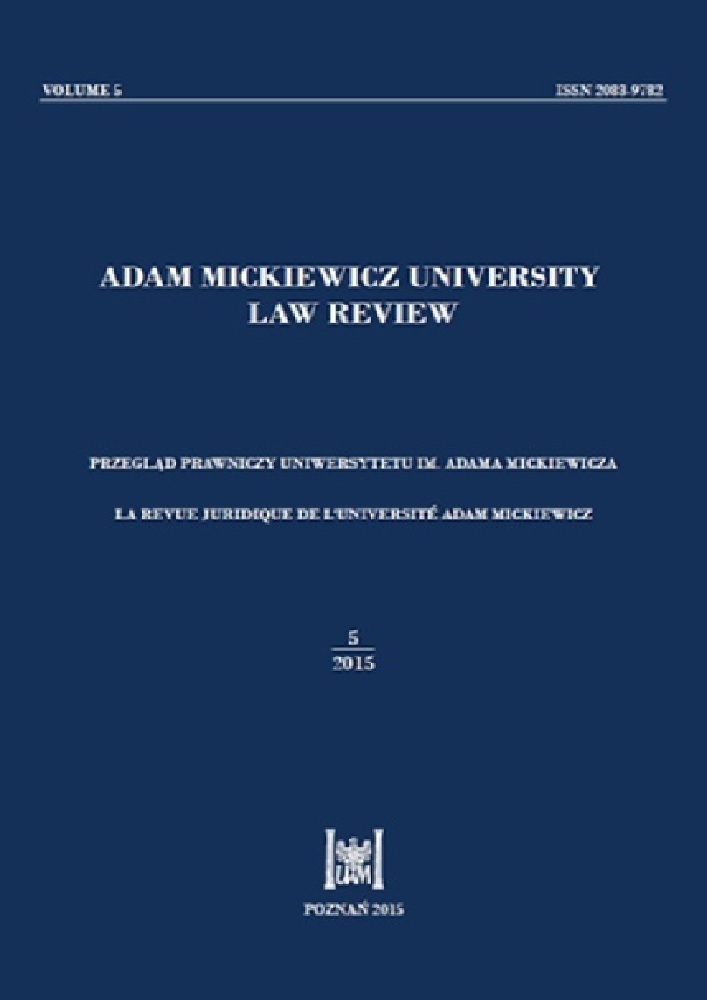Abstract
Terrorism poses a serious threat in the world today. Although it does not affect all countries to the same extent, the international community must cooperate to develop measures to effectively eradicate this common enemy. Despite the increasing number of international treaties aimed at regulating the fight against terrorism and terrorism-related acts, terrorism continues to thrive around the world, and as a result, has a significant impact on human rights. This article examines some anti-terrorist measures at the universal level and aims to determine to what extent they may infringe upon fundamental human rights. This article also highlights the importance of fundamental human rights and the risk of them being violated in the global fight against terrorism. There is no doubt that terrorism has devastating consequences on the exercise of human rights, including the right to live, the right to liberty and the physical integrity of victims as well as the individuals suspected of committing terrorist acts. The research was conducted using primarily the dogmatic method, followed by an analysis of international legal instruments. The analysis proved that the measures taken internationally in response to terrorism-related attacks may not only violate fundamental human rights but also undermine the rule of law and hinder the protection of some basic human rights. It is important, therefore, that States find a right balance between fulfilling their two obli gations: ensuring security of their citizens and fighting terrorism.
References
Arsanjani, Mahnoush H. “The Rome Statute of the International Criminal Court.” American Journal of International Law 93, no. 1. 1999: 22–43. DOI: https://doi.org/10.2307/2997954
Bassiouni, M. Cherif. “Legal Control of International Terrorism: A Policy-Oriented Assessment.” Harvard International Law Journal 43, no. 1. 2001: 83–103.
Boyle, Kevin. “Stock-Taking on Human Rights: The World Conference on Human Rights, Vienna 1993.” In Politics and Human Rights, edited by David Beetham. Oxford, Cambridge, 1995: 79–95. DOI: https://doi.org/10.1111/j.1467-9248.1995.tb01737.x
Greenwood, Christopher. “International law and the ‘war against terrorism’.” International Affairs 78, no. 2. 2002: 301–317. DOI: https://doi.org/10.1111/1468-2346.00252
Heinze, Eric A. “The evolution of international law in light of the ‘global War on Terror’.” Review of International Studies 37, no. 3. 2011: 1069–1094. DOI: https://doi.org/10.1017/S0260210510001014
Huerta-Barrientosa, Aida, and Pablo Padilla Longoria. “Understanding the Interrelationship Between Global Terrorist Attacks and the Citizen’s Wellbeing: The Complexity of Terrorism.” Sociology Study 6, no. 5. 2016: 283–292. DOI: https://doi.org/10.17265/2159-5526/2016.05.001
Kociubiński, Jakub. “Zasada nullum crimen, nulla poena sine lege i jej ograniczenia w orzecznictwie Europejskiego Trybunału Praw Człowieka.” Nowa Kodyfikacja Prawa Karnego 28. 2012: 269–283.
Lagos, Enrique, and Timothy D. Rudy. “Preventing, Punishing, and Eliminating Terrorism in the Western Hemisphere: A Post-9/11 Inter-American Treaty.” Fordham International Law Journal 26, no. 6. 2002: 1619–1648.
Lech, Marcin. Ochrona prawna społeczności międzynarodowej wobec zagrożenia terroryzmem. Gdańsk, 2014.
Lutz, James M., and Brenda J. Lutz. Terrorism: Origins and Evolution. New York, 2005. DOI: https://doi.org/10.1057/9781403978585
Mockaitis, Thomas R. The New Terrorism: Myths and Reality. Stanford, 2008.
Oehmichen, Anna. Terrorism and Anti-Terror Legislations: The Terrorised Legislator?: A comparison of Counter-Terror Legislation and Its Implication on Human Rights in the Legal Systems of the United Kingdom, Spain, Germany and France. Antwerp, Oxford, Portland, 2009.
Plantey, Alain. “Le terrorisme contre les droits de l’homme.” Revue du droit public et de la science politique en France et à l’étranger, no. 1. 1985: 5–13.
Robinson, Darryl. “The Identity Crisis of International Criminal Law.” Leiden Journal of International Law 21. 2008: 925–963. DOI: https://doi.org/10.1017/S0922156508005463
Ruby, Charles L. “The Definition of Terrorism.” Analyses of Social Issues and Public Policy 2, no. 1. 2002: 9–14. DOI: https://doi.org/10.1111/j.1530-2415.2002.00021.x
Stangos, Petros, and Georgios Gryllos. “Le droit communautaire à l’épreuve des réalités du droit international: leçons tirées de la jurisprudence récente relevant de la lutte contre le terrorisme international.” Cahiers de droit européen 42, no. 3–4. 2006: 429–482.
Van Schaack, Beth. “Crimen Sine Lege: Judicial Lawmaking at the Intersection of Law and Morals.” Georgetown Law Journal 97. 2008: 119–192.
van der Vyver, Johan D. “The ISIS Crisis and the Development of International Humanitarian Law.” Emory International Law Review 30, no. 4. 2016: 531–563.
Voeffray, François. “Le Conseil De Sécurité De L’onu :Gouvernement Mondial, Législateur Ou Juge ? Quelques Réflexions Sur Les Dangers De Dérives.” In Promoting Justice, Human Rights and Conflict Resolution Through International Law/La Promotion de la Justice, des Droits de L’Homme et du Réglement des Conflits par le Droit International: Liber Amicorum Lucius Caflisch, edited by Marcelo G. Kohen. Leiden, Boston, 2007: 1195–1209. DOI: https://doi.org/10.1163/ej.9789004153837.i-0.363
Weinberg, Leonard, Ami Pedahzur, and Sivan Hirsch-Hoefler. „The Challenges of Conceptualizing Terrorism.” Terrorism and Political Violence 16, no. 4. 2004: 777–794. DOI: https://doi.org/10.1080/095465590899768
Zoll, Andrzej. “Zasada określoności czynu zabronionego pod groźbą kary w orzecznictwie Trybunału Konstytucyjnego.” In Księga XX-lecia orzecznictwa Trybunału Konstytucyjnego, edited by Marek Zubik. Warszawa, 2006: 525–540.
License
Copyright (c) 2023 Bubacar Sidi Diallo

This work is licensed under a Creative Commons Attribution 4.0 International License.

